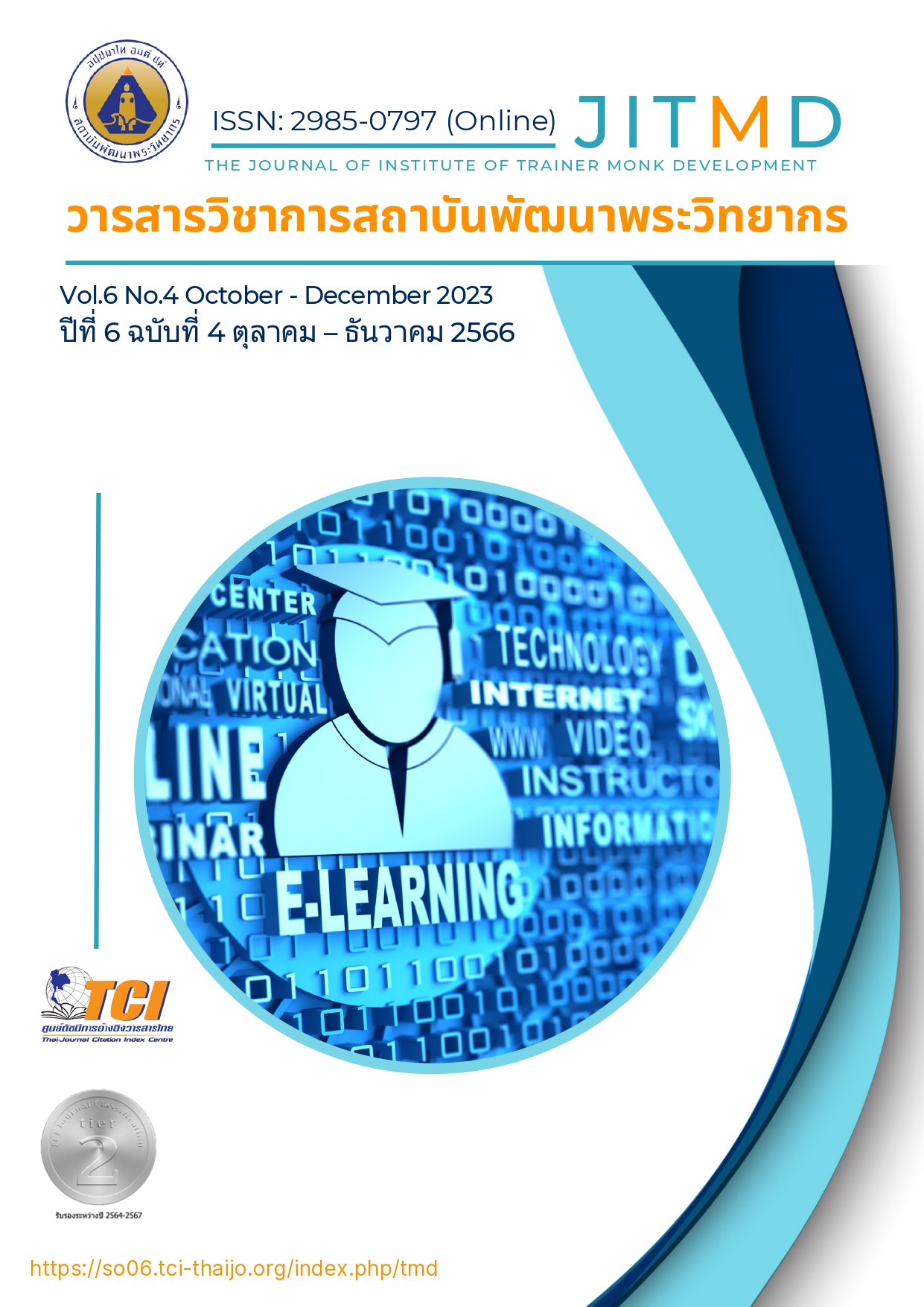Ethical Leadership Affecting the Learning Organization of School under Songkhla Primary Educational Service Area Office 3
Main Article Content
Abstract
This aimed to study 1) the school administrators’ ethical leadership; 2) the being as learning organizations of schools and 3) the ethical leadership affecting the learning organization under Songkhla Primary Educational Service Area Office 3. The samples comprised of 322 teachers. The research instrument was a five – level rating scale questionnaire with a reliability of the whole questionnaire at 0.99. The statistics used for data analysis were percentage, mean, standard deviation and stepwise multiple regression analysis. The results of the study were as follows. 1) The school administrators’ ethical leadership was rated at the high level. 2) The being as learning organizations of schools was rated at the high level. 3) The ethical leadership affecting the learning organization under Songkhla Primary Educational Service Area Office 3, it was found that the citizenship (X4) was the best predictor of the learning organizations of schools. There predictors could mutually explain the variance of the learning organization under Songkhla Primary Educational Service Area Office 3 with the statistical significance at .05 level. The predictive regression equations were as follows. Raw score regression equations: Y / = 3.989 + .068X4 Standard score regression equations: Z/Y = .115 X4
Article Details

This work is licensed under a Creative Commons Attribution-NonCommercial-NoDerivatives 4.0 International License.
บทความที่ได้รับการตีพิมพ์เป็นลิขสิทธิ์ของวารสารวิชาการสถาบันพัฒนาพระวิทยากร
ข้อความที่ปรากฎอยู่ในบทความที่ได้รับการตีพิมพ์ในวารสาร ถือเป็นความรับผิดชอบของผู้เขียนบทความ และข้อคิดเห็นนั้นไม่ถือว่าเป็นทัศนะและความรับผิดชอบของกองบรรณาธิการวารสารวิชาการสถาบันพัฒนาพระวิทยากร
References
กระทรวงศึกษาธิการ. (2553). แนวทางการจัดการเรียนรู้ตามหลักสูตรแกนกลางการศึกษาขั้นพื้นฐานพุทธศักราช 2551. กรุงเทพฯ: ชุมนุมสหกรณ์การเกษตรแห่งประเทศไทย.
นครินศร์ จับจิตต์. (2562). ปัจจัยที่มีอิทธิพลต่อองค์กรแห่งการเรียนรู้ในสถานศึกษา สังกัดสำนักงานเขตพื้นที่การศึกษาประถมศึกษาพระนครศรีอยุธยา. วิทยานิพนธ์ครุศาสตรมหาบัณฑิต สาขาวิชาการบริหารการศึกษา. บัณฑิตวิทยาลัย: มหาวิทยาลัยราชภัฏวไลยอลงกรณ์ ในพระบรมราชูปถัมภ์.
เพ็ญศิริ สมเรือน. (2560). ภาวะผู้นำเชิงจริยธรรมของผู้บริหารสถานศึกษา สังกัดสำนักงานเขตพื้นที่การศึกษาประถมศึกษาตราด. วิทยานิพนธ์ครุศาสตรมหาบัณฑิต สาขาวิชาการบริหารการศึกษา. บัณฑิตวิทยาลัย: มหาวิทยาลัยบูรพา.
ไพฑูรย์ สินลารัตน์. (2560). ความรู้คู่คุณธรรม. (พิมพ์ครั้งที่ 2). กรงเทพฯ: จุฬาลงกรณ์มหาวิทยาลัย.
ภารดี อนันต์นาวี. (2551). หลักการ แนวคิด ทฤษฎีทางการบริหารการศึกษา. ชลบุรี: สำนักพิมพ์มนตรี.
วิภาวดี อินทร์ด้วง. (2561). ภาวะผู้นำเชิงจริยธรรมของผู้บริหารสถานศึกษาตามการรับรู้ของครูสังกัดสำนักงานเขตพื้นที่การศึกษาประถมศึกษาสุราษฎร์ธานี เขต 2. การศึกษาค้นคว้าอิสระปริญญาครุศาสตรมหาบัณฑิต สาขาวิชาการบริหารการศึกษา. บัณฑิตวิทยาลัย: มหาวิทยาลัยราชภัฏสุราษฎร์ธานี.
อังศุมาลิน กุลฉวะ. (2561). ภาวะผู้นำเชิงกลยุทธ์ของผู้บริหารสถานศึกษาที่ส่งผลต่อการป็นองค์กรแห่งการเรียนรู้ของสถานศึกษา สังกัดสำนักงานเขตพื้นที่การศึกษาประถมศึกษาร้อยเอ็ด เขต 3. วิทยานิพนธครุศาสตรมหาบัณฑิต สาขาวิชาการบริหารการศึกษา. บัณฑิตวิทยาลัย: มหาวิทยาลัยราชภัฏร้อยเอ็ด.
Brown, M. E. et al. (2005). Ethical leadership: A social learning perspective for construct development and testing. Organizational Behavior and Human Decision Processes, (97)(10): 117–134.
Karakose, T. (2007). High school teachers’ perceptions towards principals’ ethical leadership in Turkey. Asia Pacific Education Review, 8(3): 464-477.
Krejcie, Robert V., and Daryle, W. Morgan. (1970). Determining Sample Size for Research Activities. Journal for Education and Psychological Measurement, 30(3): 608-616.
Mowbray, D. (2009). Code of Conduct for Ethical Leadership a Discussion Document. Retrieved [10 May 2023]. from http://www.derekmowbray.co.uk.
Senge, P.M. (1990). The fifth discipline the art and practice of the learning organization. New York: Doubleday.


